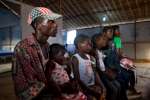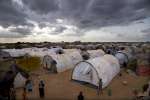Zambia's oldest refugee celebrates 100th birthday
News Stories, 2 August 2011
MAYUKWAYUKWA, Zambia, Aug 2 (UNHCR) – As fellow Angolan refugees sang, danced and ululated, Erculano Salugardo celebrated his 100th birthday with gifts, toasts and goodwill messages in one of Africa's oldest refugee settlements.
The centenarian, believed to be the oldest refugee in Zambia, was in an exuberant mood during his landmark birthday party last Friday in the Mayukwayukwa refugee settlement. He even joined in the singing after advising well wishers that the best way to reach old age was to take care of your health.
The celebration was organized by UNHCR, Zambian government officials and other refugees in the settlement. A beaming Salugardo was presented with a cake and several gifts, including a new hut, mattress, blankets, food and clothing.
The only thing missing was his family. The birthday boy arrived in Zambia on New Year's Day 2001, after fleeing the civil war in his home country. He said it was the worst day of his life because he had to leave behind his wife and four daughters in Angola's Huambo province.
"I don't have any information about what happened to my wife and all my children back in Angola. I think about them a lot and my country," he told UNHCR, adding that he had not decided whether or not to return to his homeland later this year.
He was moved after arrival to Mayukwayukwa, a predominantly rural settlement set up in 1966 in western Zambia. Salugardo said his 10 years there had been mostly lonely. He spends most of the time in his hut, but likes to tell young Angolans about African folklore and about how important education is.
"I live very well with members of the community, who really support me. Sometimes I think of marrying because of loneliness. But there is no woman who will accept me at my age," lamented the 100-year-old, who has lost the sight in one eye because of a cataract.
Salugardo has been a farmer all his life, but now he relies on hired labour and well wishers to cultivate his land. One of his friends, Antonio Chitunda Kanyama, said Salugardo manages to keep his spirits up despite missing his family.
"We manage in our own way as old men to get by despite the numerous challenges we face," Kanyama noted. "We can't do most of the things we could do in the past." Salugardo is classified as a vulnerable refugee owing to his age and this means that he gets regular assistance.
UNHCR Representative to Zambia Joyce Mends-Cole congratulated Salugardo and said his knowledge, experience and wisdom could still benefit the community.
Zambia currently hosts 49,000 refugees, with the majority being Angolans. Between 2003 and 2010, a total of 76,500 Angolans repatriated from Zambia's refugee camps and settlements.
By Kelvin Shimo in Mayukwayukwa, Zambia






















































